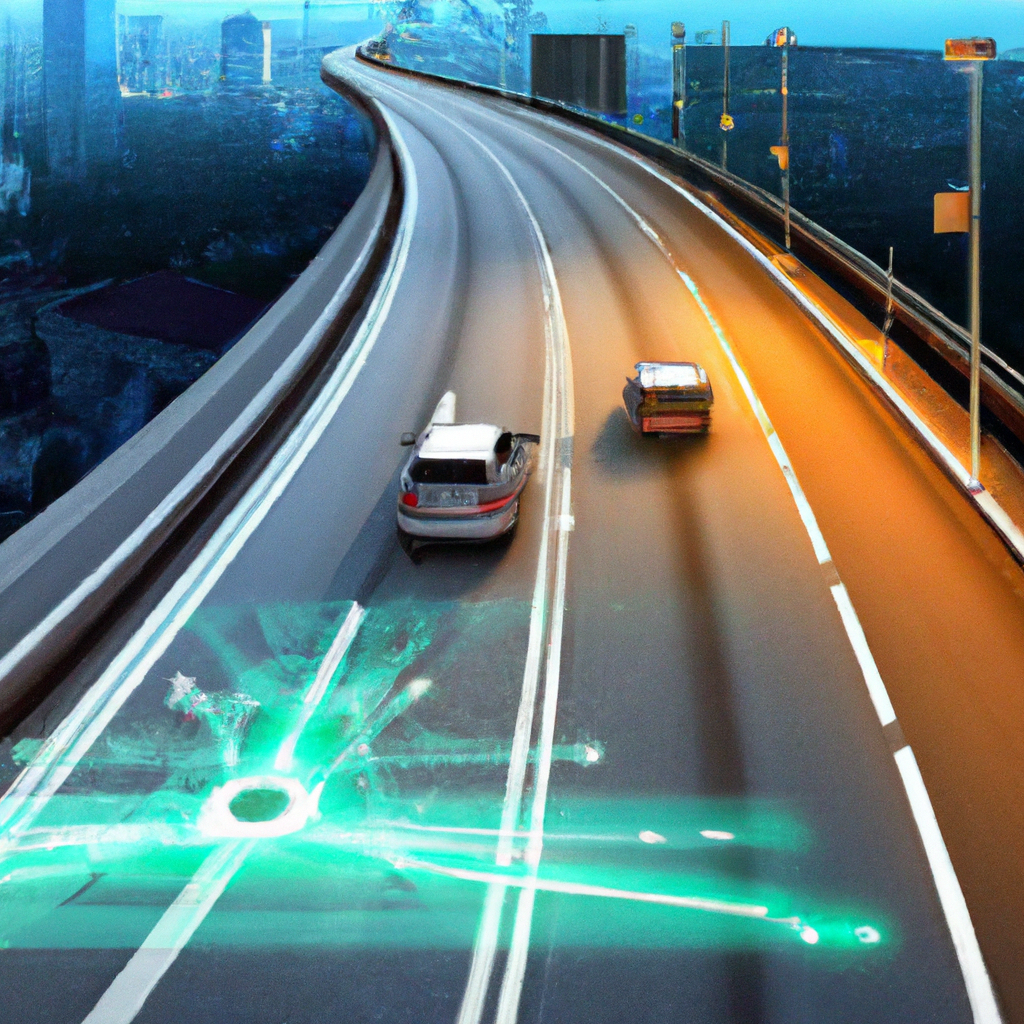Imagine driving on a road that is not just a means of transportation, but a seamlessly integrated network of smart technologies. Smart Highways, the roadways of the future, are set to revolutionize the way we travel. With embedded sensors, interactive lighting, and dynamic signage, these futuristic roads will enhance safety, efficiency, and sustainability. Step into a world where roads communicate with vehicles, where traffic congestion becomes a thing of the past, and where renewable energy powers our journeys. Buckle up for an exciting ride into the future of transportation with Smart Highways.

Understanding Smart Highways
Definition of Smart Highways
Smart Highways, also known as Intelligent Highways, refer to the integration of advanced technologies and innovative solutions into traditional road infrastructure. These highways are designed to enhance the safety, efficiency, and sustainability of road transportation. By incorporating sensors, artificial intelligence, and renewable energy technologies, smart highways aim to revolutionize the way we travel and interact with our road networks.
Origins and Development of the Concept
The concept of smart highways emerged as a response to the increasing challenges faced by traditional road infrastructure. With the rapid growth of urbanization and the ever-increasing number of vehicles on roads, it became evident that new approaches were needed to address issues such as traffic congestion, accidents, and environmental impacts. The development of smart highways can be traced back to the late 20th century, with significant advancements and pilot projects taking place in the 21st century.
Basic Characteristics of Smart Highways
Smart highways possess several key characteristics that set them apart from conventional road networks. Firstly, they incorporate a range of cutting-edge technologies, including sensors, Internet of Things (IoT) devices, and advanced data analytics. These technologies enable real-time monitoring, management, and optimization of traffic flow, allowing for dynamic adjustments based on changing conditions. Smart highways also aim to maximize energy efficiency, with the integration of renewable energy sources such as solar panels and kinetic energy harvesters. Additionally, these highways prioritize safety by employing intelligent lighting systems, warning signage, and automated systems for accident detection and emergency response.
The Current State of Smart Highways
Existing Smart Highway Projects Globally
Smart highway projects are being implemented in various countries around the world. One notable example is the Netherlands, which has pioneered numerous smart highway initiatives. The Van Gogh-Roosegaarde Smart Highway, for instance, features interactive lighting that responds to traffic conditions, weather, and time of day, creating a more dynamic and safe driving experience. In the United States, the I-70 in Colorado has implemented value pricing, variable speed limits, and managed lanes to optimize traffic flow and reduce congestion. China is also investing heavily in smart transport infrastructure, with projects such as the Intelligent Expressway System focusing on integrating innovative technologies to enhance safety and efficiency.
Technological Innovations Used in Current Projects
Current smart highway projects utilize a range of technological innovations. Sensor technologies, such as in-road sensors and vehicle detectors, provide real-time data on traffic conditions, allowing for proactive management and optimization. Internet of Things (IoT) devices, including connected vehicles and roadside infrastructure, enable seamless communication and data exchange, enhancing overall traffic control and safety. Artificial intelligence and machine learning algorithms play a crucial role in analyzing vast amounts of data to generate actionable insights for traffic management and optimization. renewable energy technologies are also being integrated into smart highways, allowing for the generation of clean energy to power lighting and other infrastructure.
Success Stories and Challenges Faced
Smart highway projects have demonstrated significant success in improving traffic management, reducing accidents, and promoting sustainability. In the Netherlands, the Smart Highway projects have received positive feedback from both drivers and local communities, with increased safety and enhanced driving experiences reported. In the United States, managed lanes and value-pricing strategies have succeeded in reducing congestion and enhancing traffic flow. However, several challenges remain. These include the high cost of implementing smart highway technologies, scalability issues, and the need for robust cybersecurity measures to protect against potential threats.
The Technology Behind Smart Highways
Use of Sensors and IoT in Route Management
Sensors and Internet of Things (IoT) devices play a fundamental role in smart highway route management. In-road sensors and vehicle detectors monitor traffic flow, collect data on vehicle speed, density, and occupancy, and transmit this information to centralized control centers. This real-time data enables authorities to actively manage traffic, identifying congestion hotspots, optimizing signal timings, and implementing dynamic lane control systems. IoT devices, including connected vehicles and smart infrastructure, facilitate seamless communication and data exchange, allowing for coordinated and efficient traffic management.
Role of Artificial Intelligence and Machine Learning
Artificial intelligence (AI) and machine learning (ML) algorithms are critical for processing and analyzing the vast amounts of data generated by smart highways. These technologies enable traffic management systems to generate real-time insights, identify patterns, and predict traffic conditions. AI-powered systems can dynamically adjust traffic signal timings, optimize signal coordination between intersections, and provide adaptive route guidance to drivers. Machine learning algorithms continuously learn from historical data to improve the accuracy and effectiveness of traffic predictions, allowing for proactive interventions and optimized traffic flow.
Application of Big Data in Traffic Data Analysis
big data analytics plays a crucial role in traffic data analysis for smart highways. By processing and analyzing large volumes of data collected from various sources, including sensors, connected vehicles, and social media, valuable insights can be derived to optimize traffic flow and improve safety. Big data analysis enables the identification of traffic patterns, congestion hotspots, and accident-prone areas. This information can then be used to develop targeted strategies, such as revised traffic signal timings or alternative routing options, to improve overall traffic management and reduce delays.
Renewable Energy Technology in Smart Highways
Renewable energy technologies are integrated into smart highways to reduce environmental impacts and promote sustainability. Solar panels are commonly installed along the highways, harnessing solar energy to power street lighting, signage, and surveillance systems. Kinetic energy harvesters, which capture the energy generated by passing vehicles, are also being used to generate electricity for powering infrastructure. By utilizing renewable energy sources, smart highways contribute to the reduction of greenhouse gas emissions and overall energy consumption, advancing the goal of creating more environmentally friendly transportation systems.
Benefits of Smart Highways
Improvement in Traffic Management
One of the primary benefits of smart highways is the significant improvement in traffic management. Real-time data collection and analysis allow authorities to better understand traffic patterns, identify congestion hotspots, and optimize traffic flow through intelligent signal coordination and variable speed limits. By reducing congestion and minimizing delays, smart highways enhance the overall efficiency of road transportation, saving both time and fuel.
Reduction in Road Accidents
Smart highways also contribute to the reduction in road accidents. With advanced sensor technologies and AI-powered systems, potential hazards can be detected and mitigated in real-time. Intelligent lighting systems that adjust brightness according to weather conditions can enhance visibility, reducing the risk of accidents. Additionally, smart highways enable proactive management of traffic flow, reducing the likelihood of rear-end collisions and other accident-prone scenarios.
Promotion of Green and Sustainable Practices
The integration of renewable energy technologies in smart highways promotes green and sustainable practices. By harnessing solar energy and capturing the energy generated by passing vehicles, these highways reduce reliance on traditional energy sources and contribute to the reduction of greenhouse gas emissions. Additionally, smart highways support the adoption of electric vehicles by providing charging infrastructure, further mitigating the environmental impacts of road transportation.
Economic Benefits of Smart Highways
Smart highways offer significant economic benefits. By improving traffic flow and reducing congestion, these highways allow for more efficient transportation of goods and services, enhancing productivity. Moreover, the reduction in accidents results in lower healthcare costs and property damage expenses. With the integration of renewable energy technologies, smart highways also contribute to energy cost savings and the creation of new jobs in the renewable energy sector.

Potential Difficulties and Solutions in Implementing Smart Highways
Infrastructure and Technological Challenges
Implementing smart highways presents challenges related to infrastructure and technology. Retrofitting existing road networks with the necessary sensors and infrastructure can be costly and time-consuming. Furthermore, ensuring compatibility and interoperability between different technology systems is critical for seamless communication and data exchange. Integration with existing transportation management systems and addressing scalability issues are also essential considerations when implementing smart highways.
Privacy and Security Concerns
As smart highways rely on data collection and analysis, privacy and security concerns arise. The collection of real-time data on vehicle movement and personal information raises privacy concerns. Additionally, the transmission and storage of this data require robust cybersecurity measures to protect against potential attacks or unauthorized access. Building strong data governance frameworks and implementing secure communication protocols are necessary to address these concerns and ensure public trust in smart highway technologies.
Solutions and Mitigations for these Challenges
To address infrastructure and technological challenges, a phased approach to implementation can be adopted. Starting with pilot projects allows for testing and refining technologies and infrastructure before full-scale implementation. Establishing partnerships between government bodies, technology companies, and research institutions also facilitates knowledge sharing and expertise exchange. Addressing privacy and security concerns requires the development of comprehensive regulations and standards for data privacy and cybersecurity. Implementing strict access controls, encryption techniques, and regular security audits can also help mitigate risks.
Role of Government and Policymaking in Smart Highways
Legal Frameworks for Smart Highways
Governments play a crucial role in facilitating the implementation of smart highways through policymaking and legal frameworks. These frameworks govern the deployment, operation, and management of smart highway technologies, ensuring compliance with safety, environmental, and privacy regulations. They also regulate the collection, storage, and use of data generated by smart highways, safeguarding the privacy and security of individuals. Additionally, legal frameworks outline the responsibilities of different stakeholders, including government agencies, technology companies, and road operators.
Government Initiatives and Support
Governments around the world are actively supporting the development and implementation of smart highways through various initiatives. They provide funding and grants to research institutions and technology companies to encourage innovation in smart transportation. Governments also collaborate with industry stakeholders to develop standards and guidelines for smart highway technologies. Furthermore, they establish public-private partnerships to leverage the expertise of both sectors in implementing and managing smart highway projects.
Public-Private Partnerships in Smart Highway Projects
The collaboration between governments and private entities is essential for the successful implementation of smart highway projects. Public-private partnerships bring together the resources, expertise, and knowledge of both sectors, enabling the development and deployment of innovative technologies and solutions. Governments provide the regulatory framework and funding, while private entities contribute technological know-how, implementation capabilities, and operational expertise. This collaboration ensures that smart highways are designed, built, and managed in a manner that meets the needs of the public while maximizing efficiency and sustainability.

Future Trends in Smart Highways
The Growth of Autonomous Vehicles and Smart Highways
The future of smart highways is closely linked to the growth of autonomous vehicles. As the adoption of autonomous vehicles increases, smart highways will play a crucial role in facilitating their safe and efficient operation. Advanced communication networks, dedicated lanes, and intelligent infrastructure will be essential to support autonomous vehicle navigation and communication. Smart highways will also enable the integration of autonomous vehicle data with traffic management systems, leading to optimized traffic flow and reduced congestion.
Technological Innovations on the Horizon
The future of smart highways will witness the emergence of new technological innovations. These may include advanced sensor technologies capable of detecting a wider range of traffic conditions and hazards, as well as improved AI algorithms for real-time traffic analysis and prediction. Additionally, the integration of blockchain technology may enhance data security and transparency in smart highway systems. The evolution of smart vehicle-to-infrastructure communication systems will also enable seamless interaction between vehicles and highway infrastructure, further improving safety and navigation.
Predictions for the Future of Road Travel
Smart highways will revolutionize the future of road travel in several ways. Firstly, enhanced traffic management and optimization will result in reduced travel times, decreased congestion, and improved overall driving experiences. The integration of autonomous vehicles into smart highway systems will promote safer and more efficient travel, reducing the likelihood of human error-related accidents. Furthermore, as renewable energy technologies become more advanced and widespread, smart highways will contribute to a greener and more sustainable transportation system.
Impacts of Smart Highways on the Automobile Industry
Changing Automobile Designs
The development of smart highways will have a profound impact on automobile designs. As autonomous vehicles become prevalent, vehicle interiors will be reimagined to prioritize passenger comfort and productivity rather than driver-centric controls. Additionally, the integration of vehicle-to-infrastructure communication systems will require vehicles to have advanced sensor technologies and connectivity capabilities. As a result, automobile manufacturers will need to adapt their designs to meet these changing requirements and provide seamless integration with smart highway technologies.
Implication on Insurance and Liability
The emergence of autonomous vehicles and the implementation of smart highways will have implications for the insurance industry and the concept of liability. With the reduction in human error-related accidents, liability may shift from individuals to manufacturers or system operators in the case of technology failures. Insurance policies may need to be reimagined to account for autonomous driving capabilities and the use of smart highway technologies. Additionally, insurance premiums may be influenced by data collected from vehicles and smart highways, such as driving behavior and traffic conditions.
New Business Models in the Automobile Industry
The integration of smart highways and autonomous vehicles will lead to the emergence of new business models in the automobile industry. Vehicle manufacturers may explore opportunities in providing mobility services rather than selling individual vehicles. Ride-sharing and car-sharing platforms may become more prevalent, with autonomous vehicles serving as convenient and efficient modes of transportation. Additionally, data-driven services, such as real-time traffic information and personalized route planning, may generate new revenue streams for manufacturers and service providers.

Public Reception and Perception of Smart Highways
Public’s Understanding and Awareness of Smart Highways
The public’s understanding and awareness of smart highways vary widely. While some individuals may have a clear understanding of the concept and its potential benefits, others may be relatively unaware of the advancements being made in this field. Public education and awareness campaigns are essential to inform the general population about the capabilities and potential impact of smart highways. By highlighting the benefits, such as improved safety and reduced congestion, awareness can be raised and public support for the implementation of smart highways can be garnered.
Public Opinion on the Adoption of Smart Highways
Public opinion regarding the adoption of smart highways is nuanced and influenced by various factors. Concerns about privacy, data security, and potential job displacement due to autonomous vehicles and automation may contribute to skepticism or resistance. However, individuals who have experienced the benefits of smart highway technologies, such as reduced commute times and enhanced safety, generally express positive opinions. To ensure a positive public opinion, it is crucial to address concerns, maintain transparency, and engage in meaningful dialogue with the public through consultation processes and community engagement initiatives.
Community Engagement in Smart Highway Development
Community engagement plays a crucial role in the development and implementation of smart highways. Involving local communities from the early stages of project planning fosters a sense of ownership and allows for the integration of local knowledge and needs. Community input in the design and implementation process can help address local traffic issues and ensure that smart highways meet the specific requirements of different regions. Regular communication, public workshops, and information sharing sessions enable meaningful engagement, creating a sense of shared responsibility and support for smart highway projects.
Case Studies of Successful Smart Highway Implementations
Smart Highway Projects in the Netherlands
The Netherlands has been at the forefront of smart highway development, implementing several successful projects. The Van Gogh-Roosegaarde Smart Highway is one notable example, featuring interactive lighting that responds to traffic conditions, weather, and time of day. This project has demonstrated significant success in improving safety and enhancing driver experiences. Other projects, such as the Smart Road Arnhem-Nijmegen and the A270 Helmond, focus on sustainable solutions, including energy-generating road surfaces and dynamic traffic management systems. These projects showcase the innovative approaches and collaboration between government, industry, and researchers in the Netherlands.
The United States’ Integration of Smart Highway Technologies
In the United States, numerous smart highway projects have been implemented to optimize traffic flow and enhance safety. The I-70 in Colorado, for example, has implemented managed lanes and value pricing strategies to reduce congestion and improve travel times. The I-4 Ultimate project in Florida incorporates intelligent transportation systems, advanced sensors, and data analytics to manage traffic and enhance safety. These projects demonstrate the country’s commitment to utilizing advanced technologies and innovative solutions to address transportation challenges and improve the overall driving experience.
China’s Evolution into Smart Transport Infrastructure
China has rapidly evolved into a global leader in smart transport infrastructure. The country has invested heavily in the development and implementation of smart highway technologies to enhance traffic management and optimize travel experiences. The Intelligent Expressway System, for instance, utilizes a comprehensive network of sensors, smart signs, and connected vehicles to improve safety and efficiency. China’s focus on smart transport infrastructure aligns with its goal of becoming a leader in emerging technologies, such as autonomous vehicles and artificial intelligence, ensuring its transportation network can support future advancements.
In conclusion, smart highways represent the roadways of the future, integrating advanced technologies and innovative solutions to enhance safety, efficiency, and sustainability. The current state of smart highways is characterized by various projects globally, utilizing sensor technologies, IoT devices, artificial intelligence, and renewable energy sources. These projects have demonstrated success in improving traffic management, reducing accidents, and promoting sustainable practices. As smart highway technologies continue to evolve, they will reshape the automobile industry, impact insurance and liability, and give rise to new business models. Public reception and perception of smart highways vary, emphasizing the importance of education, community engagement, and addressing concerns around privacy and security. Governments play a vital role in policymaking, supporting initiatives, and fostering public-private partnerships to ensure the successful implementation and future growth of smart highways. With future trends focusing on autonomous vehicles and the emergence of technological innovations, smart highways hold immense potential to transform road travel, enhance safety, and create a more sustainable transportation system.











